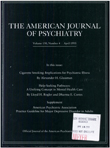Cost offset from a psychiatric consultation-liaison intervention with elderly hip fracture patients
Abstract
OBJECTIVE: The authors hypothesized that psychiatric liaison screening of elderly patients with hip fractures would shorten the average length of hospital stay and increase the proportion of patients who returned home after discharge. METHOD: The study was performed at Mount Sinai Medical Center in New York and Northwestern Memorial Hospital in Chicago. The subjects were 452 patients 65 years or older who were consecutively admitted for surgical repair of fractured hips. During a baseline year the patients received traditional referral for psychiatric consultation. During the experimental year all the patients at Mount Sinai and the patients on one Northwestern Unit were screened for psychiatric consultation. RESULTS: The patients who received psychiatric liaison screening had a higher consultation rate than those who received traditional consultation. The rates of DSM-III disorders in the experimental year were 56% at Mount Sinai and 60% at Northwestern. The mean length of stay was reduced from 20.7 to 18.5 days at Mount Sinai and from 15.5 to 13.8 days at Northwestern, resulting in reductions in hospital costs ($647/day) of $166,926 and $97,361, respectively. Fees generated from Medicare service delivery could have paid for the $20,000 psychiatric intervention cost at each site. There was no difference, however, between the two years in the discharge placement of patients. CONCLUSIONS: Admission psychiatric liaison screening of elderly patients with hip fractures results in early detection of psychiatric morbidity, better psychiatric care, earlier discharge, and substantial cost savings to the hospital.
Access content
To read the fulltext, please use one of the options below to sign in or purchase access.- Personal login
- Institutional Login
- Sign in via OpenAthens
- Register for access
-
Please login/register if you wish to pair your device and check access availability.
Not a subscriber?
PsychiatryOnline subscription options offer access to the DSM-5 library, books, journals, CME, and patient resources. This all-in-one virtual library provides psychiatrists and mental health professionals with key resources for diagnosis, treatment, research, and professional development.
Need more help? PsychiatryOnline Customer Service may be reached by emailing [email protected] or by calling 800-368-5777 (in the U.S.) or 703-907-7322 (outside the U.S.).



